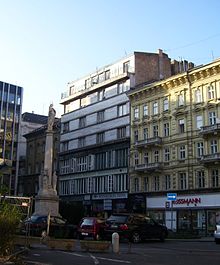Márk Rózsavölgyi
Márk Rózsavölgyi (born as Mordechai ("Motke"), Mark Rosenthal in 1789 in Balassagyarmat , Habsburg Monarchy ; died January 23, 1848 in Pest ) was a Hungarian composer and violinist . He is known as the "father of Csardas ".
Life
Rózsavölgyi was born into a poor merchant family in Balassagyarmat . His bronze bust (by Jelena Veszely, 1967) is there today in the Palóc grove .
His Jewish family probably had ties to the klezmer tradition .
From 11 to 19 he worked as a clerk in Vienna , Pressburg and Prague and during this time taught himself to play the violin. After going to Pest at the age of 19, he devoted himself entirely to music. His compositions from this period are entirely in the traditional Hungarian style and include many Verbunkos . It was first published in 1811; in total he published over 200 works. In 1812 he was appointed conductor of the orchestra of the German theater in Pest.
From Pest he traveled to the Habsburg Empire and spent a long time in Baja and Temesvár .
In 1824 he became a paid member of the Philharmonic Society of Veszprém appointed, and his name of "Rosenthal" to "Rózsavölgyi" ungarisiert (the name change was to 1846 but not officially recognized). Rózsavölgyi gave several concerts on the occasion of the coronation celebrations in Pressburg in 1830; In 1835 he was invited to the Vienna State Opera . Two years later, in 1837, at the opening of the Pest National Theater , the orchestra played a piece he composed especially for the occasion, and he subsequently became a regular member of the orchestra.
During the 1840s he founded his own ensemble and played for Franz Liszt in May 1846 in Pest. Liszt used some of his tunes in his Hungarian Rhapsodies No. 8 and 12. Some important Roma musicians as Patikárus, Sárközi, Farkas were Rózsavölgyis students.
After 1846 his health slowly began to deteriorate, he died impoverished in Pest and was buried there in the Jewish cemetery . After his death, the Hungarian national poet Sándor Petőfi wrote a long poem in his honor, in which he reprimanded the Hungarian population for leaving this musician so alone in his last years.
His son Gyula Rózsavölgy (Julius Rosenthal) founded a musical publishing company in 1850 , which now exists again in Budapest under the name Rózsavölgyi és Társa after it was nationalized in 1949 and re-established in 2002.
literature
- Ignaz Reich, Beth-El. Honorary temple of deserving Hungarian Israelites , 2nd, improved. 3rd edition. Pesth 1867–68.
- Constantin von Wurzbach : Rózsavölgyi, Marcus . In: Biographisches Lexikon des Kaiserthums Oesterreich . 27th part. Kaiserlich-Königliche Hof- und Staatsdruckerei, Vienna 1874, pp. 191–193 ( digitized version ).
- [1] by Isidore Singer and Ludwig Venetianer; corrected and extended in Wikipedia .
- Raphael Patai, The Jews of Hungary: history, culture, psychology , Wayne State University Press, 1996, ISBN 0814325610 , ISBN 9780814325612 , page 259.
- Ferenc Bónis, "Rózsavölgyi, Mark", Grove Music Online , ed. L. Macy (accessed April 24, 2006), grovemusic.com (subscription access).
Recordings
Rózsavölgyi: 'Ballroom Dances' (17 dances and dance-sequences). Festetics Quartet. Hungaraton HCD 31781 (1998)
Web links
- Rózsavölgyi Márk in Magyar Életrajzi Lexicon ( Hungarian )
- Rózsavölgyi.hu (Hungarian)
- Works by and about Márk Rózsavölgyi in the catalog of the German National Library
Individual evidence
- ↑ here is also given 1787 , also in Patai, p. 259.
- ↑ List of works VESZELY Jelena (Ljaskovica, 1917 November 28) Rózsavölgyi Márk (bronze, 1967, Balassagyarmat, Palóc-ligetben látható)
- ^ Rózsavölgyi Online
| personal data | |
|---|---|
| SURNAME | Rózsavölgyi, Márk |
| ALTERNATIVE NAMES | Rosenthal, Mark (maiden name) |
| BRIEF DESCRIPTION | Hungarian composer and violinist |
| DATE OF BIRTH | 1789 |
| PLACE OF BIRTH | Balassagyarmat |
| DATE OF DEATH | January 23, 1848 |
| Place of death | pest |


